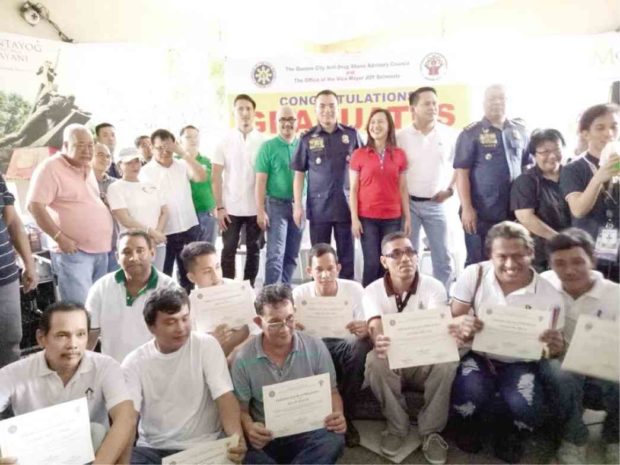530 QC druggies ‘graduate’

Some of the new graduates proudly show their certificates during a ceremony on Saturday with local government and police officials. —PHOTO COURTESY OF QC GOVERNMENT
Over 530 surrenderers under the Oplan Tokhang campaign in Quezon City marched during their “graduation” ceremony on Saturday, taking a step toward a new life away from drugs.
Former drug dependents from 99 barangays gathered at City Hall to receive certificates for completing the community-based drug rehabilitation program conducted by the local government.
The 534 graduates were part of the second batch that finished the program, out of the thousands who had enlisted under Tokhang, the campaign launched early in the Duterte administration that called on drug users to come out and be registered for rehabilitation.
This particular batch was the first to complete the “full process,” which ran for at least three months, according to Rowena Macatao, executive director of the QC Anti-Drug Abuse Advisory Council (CADAAC).
“The first batch only had 24 sessions,” she said in an interview with the Inquirer. “This batch completed the whole process, from profiling to undergoing all 15 modules, as well as the spiritual component.’’
Article continues after this advertisementThe city’s community-based rehabilitation adopted methods of intervention drawn up by the Psychological Association of the Philippines (PAP) in response to the drug war.
Article continues after this advertisementAccording to the PAP website, the interventions are composed of 15 modules focusing on drug recovery, life skills and the family.
Macatao said the total number of graduates should have been 745 from the city’s six districts. However, 159 tested positive in recent drug tests, while 53 had yet to undergo the testing due to scheduling conflicts.
Data from the Quezon City Police District (QCPD) showed that since the start of the Duterte administration in July last year, a total of 19,704 drug users in the city had surrendered to authorities.
During Saturday’s ceremony, Vice Mayor Joy Belmonte reiterated that killing people had never been the antidrug policy in the city.
“Our battlecry has always been people can change,” she said. “And that belief has led us to this day.”
Macatao said the graduates would still be monitored under the Masa Masid program of the Department of the Interior and Local Government.
Sustainability programs would also be made available to help them move forward, including livelihood assistance and career profiling, she said.
So far, 11 graduates have received livelihood assistance while two have been enrolled in programs under the Technical Education and Skills Development Authority (Tesda) and the Alternative Learning System under the Department of Education.
Majority of the surrenderers have already been employed, while about 2,000 more are undergoing rehabilitation, Macatao said.